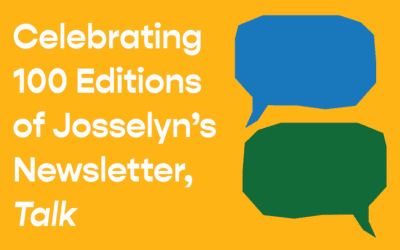By Charity Williams-Hadley, LSW
Black History Month Feature
In honor of Black History Month, Josselyn spotlights therapist Charity Williams-Hadley, LSW, as she shares her perspective on Black history and mental health.

A few years ago, inspired by their trip to the Legacy Museum in Montgomery, AL, my parents began gifting me an annual calendar published by the Equal Justice Initiative. Each page of the calendar, entitled A History of Racial Injustice, features beautiful photos along with a short essay and daily facts that detail important moments in history throughout the centuries-long fight for racial justice. For instance, if I go to my birthday, July 18th, the square on the 2025 calendar states the following: “1946 – White men shoot World War II veteran Maceo Snipes in the back at his home the day after he became the first Black person to cast a vote in Taylor County, Georgia.”[1]
While I appreciated being given the calendars each year, I have found myself growing resentful of them. Any time I look at the racial injustice fact of the day, I am met with a sad, often brutal fact of a tragic incident, usually against a Black person or group of Black people. I began to avoid reading it, not wanting to be reminded of yet another instance of brutal racism that occurred this day throughout history. I wished the calendar focused more on positive events in Black history.
However, this Black History Month, I am re-examining my feelings toward the calendar. I realize that focusing only on the moments of progress throughout Black history does not provide the full story. It is important to recognize the pain and struggle those before me withstood, which helps provide important context to the positive achievements.
The truth is the events of the calendar are real. They actually happened. As a Black person, this reality can weigh heavily on us every day, leading to mental health struggles like depression, anxiety, and even chronic illness.[2] The constant trauma and re-traumatization of past racist policies, hate crimes, and even day-to-day interactions can make it feel like nothing is in our control, and some may feel the need to give up.
So, what are we to do in present and future times of turmoil, when things feel out of control? More specifically, what am I to say to my Black clients who feel scared, hopeless, and discouraged? Of course I provide coping strategies, but I also help them identify what are called protective factors. These are factors in someone’s life, including supportive people, communities, and hobbies, that help someone develop resilience toward stressful events and reduce the likelihood of developing serious mental challenges. [3]
For me, the protective factor I am most utilizing right now is community. I am fortunate to have a community of family and chosen family who I love and who love me unconditionally. When I am feeling discouraged or feeling like I can’t open my phone without being reminded of another instance of racial injustice, I put my phone down, take a breath, and engage in connection. I hug my spouse, or I call a friend, or visit my sister. Though racial progress is a long-term struggle, I believe staying connected with my community and knowing my history will build my resilience to keep moving forward.
Josselyn is a Center of Excellence for trauma therapy with nearly 50 clinicians certified in EMDR, an evidence-based treatment for trauma. If you or someone you know may benefit from EMDR therapy, Josselyn is here to help. Get started now.
[1] Equal Justice Initiative. (2025). A history of racial injustice calendar. Equal Justice Initiative.
[2] Cénat J. M. (2023). Complex Racial Trauma: Evidence, Theory, Assessment, and Treatment. Perspectives on psychological science : a journal of the Association for Psychological Science, 18(3), 675–687. https://doi.org/10.1177/17456916221120428
[3] Mental Health First Aid. (2022, January 5). How protective factors can promote resilience. Mental Health First Aid. https://www.mentalhealthfirstaid.org/2022/01/how-protective-factors-can-promote-resilience/




